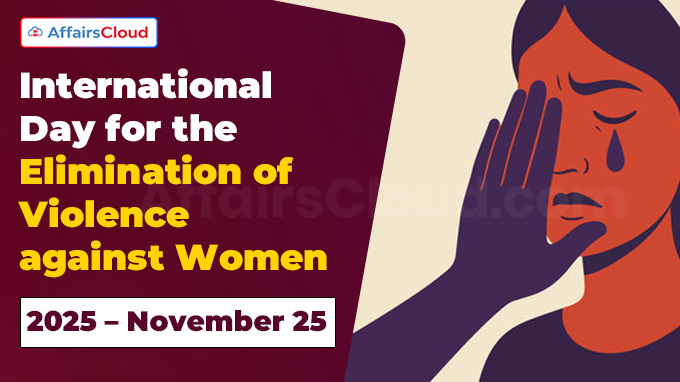The United Nations (UN) observes the International Day for the Elimination of Violence against Women every year on 25 November to raise worldwide awareness of violence against women and to emphasize the need for stronger efforts to prevent it.
- 25th November 2025 marks the 26th International Day for the Elimination of Violence against Women.
Exam Hints:
- Event: International Day for the Elimination of Violence against Women 2025
- When? November 25
- 2025 Observance: 26th
- Proclamation: UNGA Resolution A/RES/54/134 (2000)
- First Observed: 25 November 2000
- 2025 UNiTE Campaign:25 Nov – 10 Dec (16 days of activism)
- Theme: “UNiTE to End Digital Violence against Women and Girls”
- Partnership: Actor Samantha Ruth Prabhu supports awareness efforts
- 2025 Femicides Report:
- Released by UN Women & UNODC
- ~50,000 women/girls killed in 2024 by intimate partners/family
Background:
Proclamation: In 2000, the United Nations General Assembly (UNGA) adopted Resolution A/RES/54/134, officially designating 25 November each year as the International Day for the Elimination of Violence against Women.
First Observance: The inaugural observance of the International Day for the Elimination of Violence against Women took place on 25 November 2000.
Significance of Date: The date honors the Mirabal sisters of the Dominican Republic: Patria, Minerva, and María Teresa, who were assassinated on 25 November 1960 for resisting the dictatorship of Rafael Trujillo.
- Known as the “Inolvidables Mariposas” (Unforgettable Butterflies), the sisters have become a global symbol of the fight against violence and oppression of women.
About 2025 UNiTE Campaign:
Campaign: The International Day for the Elimination of Violence Against Women marks the start of the UNiTE campaign (25 November–10 December), a 16-day global activism effort that concludes on International Human Rights Day (10 December).
Theme: The 2025 UNiTE campaign, titled “UNiTE to End Digital Violence against Women and Girls”, aims to mobilize all sections of society.
Call to Action: The campaign urges collective action, calling on governments to enforce laws against digital violence, tech companies to ensure safer online platforms, donors to fund feminist organizations, and individuals to speak up and support survivors.
Orange Day: The UNiTE campaign has proclaimed the 25th of each month as “Orange Day”, a day to raise awareness and take action to end violence against women and girls (VAWG).
UN Women India Partnership: For the 2025 campaign, the United Nations Programme for Gender Equality and the Empowerment of Women(UN Women) India has partnered with acclaimed Indian actor Samantha Ruth Prabhu to raise awareness and amplify the campaign’s impact.
2025 Femicides Report:
Overview: On the occasion of 2025 International Day for the Elimination of Violence against Women, UN Women and the UN Office on Drugs and Crime (UNODC) released a joint report titled “Femicides in 2024: Global estimates of intimate partner/family member femicides”, providing updated global and regional estimates of women and girls killed by intimate partners or other family members in 2024.
Global Estimate of Femicides: In 2024, approximately 50,000 women and girls worldwide were estimated to have been killed by an intimate partner or family member.
Daily Impact: This represents about 60% of all intentional killings of women and girls in 2024, meaning that on average 137 women or girls were killed every day by someone within their own family.
Gender Disparity: Women are disproportionately affected in the domestic sphere: 60% of female homicides are by family or partners, compared to only 11% of male homicides.
Regional Trends: Africa has the highest femicide rates relative to its female population, while reliable trend data is currently available only for the Americas and Europe.
India’s Efforts to Combat Violence Against Women:
The Ministry of Women and Child Development (MoWCD) spearheads these efforts, combining safety (Sambal) and empowerment (Samarthya) programs under the Mission Shakti scheme.
National Commission for Women (NCW): Established on 31 January 1992 as a statutory body, the NCW monitors constitutional and legal safeguards for women, recommends law amendments, and investigates complaints of rights violations.
Bharatiya Nyaya Sanhita, 2023: From 1 July 2024, it replaces the Indian Penal Code (IPC), imposes strict penalties for sexual offenses, including life imprisonment for minor rape, expands offense definitions, and prioritizes women and children’s cases with recorded victim statements.
Protection of Women from Domestic Violence Act, 2005 (PWDVA): In India, domestic violence is regulated under this Act, which defines an “aggrieved person” as any woman who is or has been in a domestic relationship with the respondent.
Sexual Harassment of Women at Workplace Act, 2013: This Act covers all women, regardless of age, job type, or sector, and requires workplaces.
- The MWCD oversees implementation and awareness, and manages SHe-Box, a portal for reporting and tracking complaints, with inquiries mandated to be completed within 90 days.
Mission Shakti: Launched in 2021, it is an umbrella scheme to strengthen women’s safety, security, and empowerment, promote women-led development, and foster citizen participation in nation-building.
Swadhar Greh Scheme:Implemented by the MWCD and revised from 1 April 2016, the scheme provides shelter and support for women and girls facing homelessness, violence, mental stress, social ostracism, or risk of forced prostitution.
One Stop Centre (OSC) Scheme: Launched by the MWCD on 1 April 2015, OSCs offer integrated services under one roof, including police assistance, medical and legal aid, psycho-social counselling, and temporary shelter for women affected by violence or in distress.
National Domestic Violence Helpline: Launched on 1 April 2015 under the Universalisation of Women Helpline (WHL) Scheme, the helpline provides 24×7 support to women facing violence or distress via toll-free number 181.
Fast Track Special Courts (FTSCs): It operational under the Nirbhaya Fund, expedite rape and POCSO trials; as of August 2025, 773 courts (including 400 e-POCSO courts) are functional across 29 States/UTs, disposing of over 334,213 cases.
Women Help Desks (WHDs): It was established in police stations enable sensitive reporting of gender-based violence; as of February 2025, 14,658 desks nationwide provide FIR facilitation, counselling, and legal aid.





